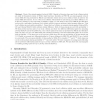Free Online Productivity Tools
i2Speak
i2Symbol
i2OCR
iTex2Img
iWeb2Print
iWeb2Shot
i2Type
iPdf2Split
iPdf2Merge
i2Bopomofo
i2Arabic
i2Style
i2Image
i2PDF
iLatex2Rtf
Sci2ools
ACISP
2008
Springer
2008
Springer
Non-linear Reduced Round Attacks against SHA-2 Hash Family
Most of the attacks against (reduced) SHA-2 family in literature have used local collisions which are valid for linearized version of SHA-2 hash functions. Recently, at FSE ’08, an attack against reduced round SHA-256 was presented by Nikoli´c and Biryukov which used a local collision which is valid for the actual SHA-256 function. It is a 9-step local collision which starts by introducing a modular difference of 1 in the two messages. It succeeds with probability roughly 1/3. We build on the work of Nikoli´c and Biryukov and provide a generalized nonlinear local collision which accepts an arbitrary initial message difference. This
| Added | 01 Jun 2010 |
| Updated | 01 Jun 2010 |
| Type | Conference |
| Year | 2008 |
| Where | ACISP |
| Authors | Somitra Kumar Sanadhya, Palash Sarkar |
Comments (0)

